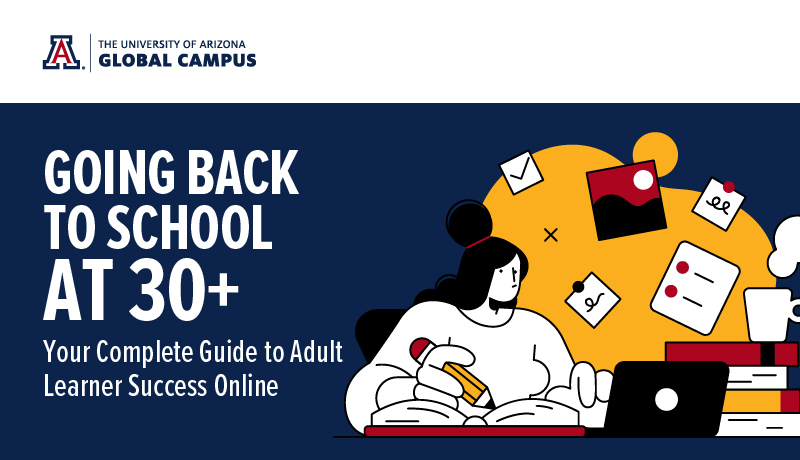
Going back to school at any age conjures up many images — a return to routine, exciting opportunities, "a bouquet of newly sharpened pencils," to quote the beloved "You've Got Mail". What it might not bring to mind immediately: going back to school at 30, 40, or beyond — as a parent, career changer, or someone who didn't have the option to finish their degree in the first place.
For many people, college was long thought of as a privilege offered only to those who could afford the time and the tuition. In these cases, learning would take a back seat to work or family, and the concept of earning a degree would feel forever out of reach. That's changed, fortunately, as online learning has created new opportunities for students anywhere in the world.
Just the thought of starting college in your 40s or 50s can seem scary, and perhaps even pointless. But for people with clear goals and the inner strength it takes to follow through, pursuing your dreams and earning your diploma after 40 is not impossible. All it takes is a little preparation to lay the foundation for your success.
By the Numbers: Adult Learners Dominate
The number of enrolled students ages 25 and older was expected to rise through 2024, according to the National Center for Education Statistics. EdSurge found that number to be 40%. With technology giving them easier access to college, adult learners are overcoming their anxieties about school and embracing the possibility of using school to extend or shift careers.
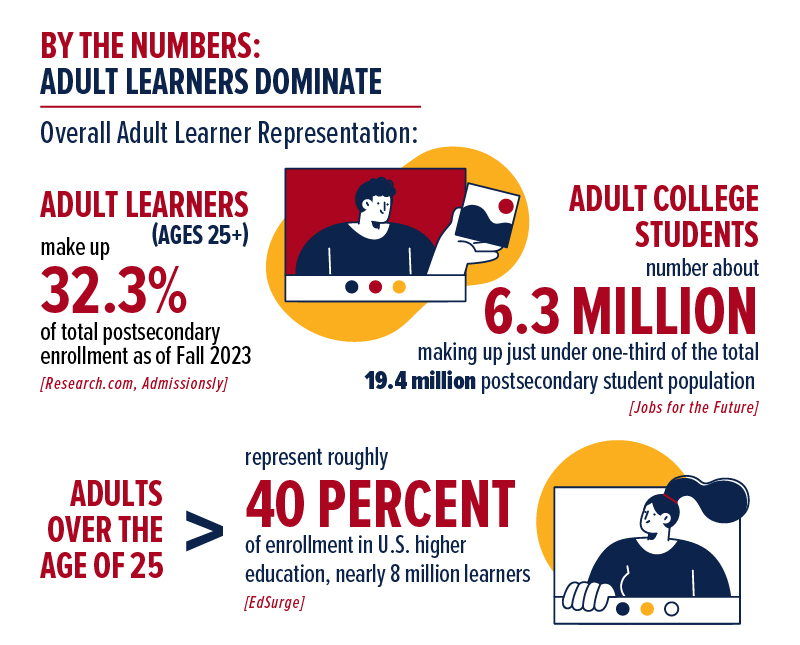
Returning students and working adults comprise 68% of online education enrollment according to Research.com, a testament to how online learning has become the preferred pathway for professionals seeking to advance their careers while managing existing responsibilities. With many online learners older than the average first-time college student, and 80% reporting full-time employment, online programs have become the essential bridge between work and education for millions of Americans.
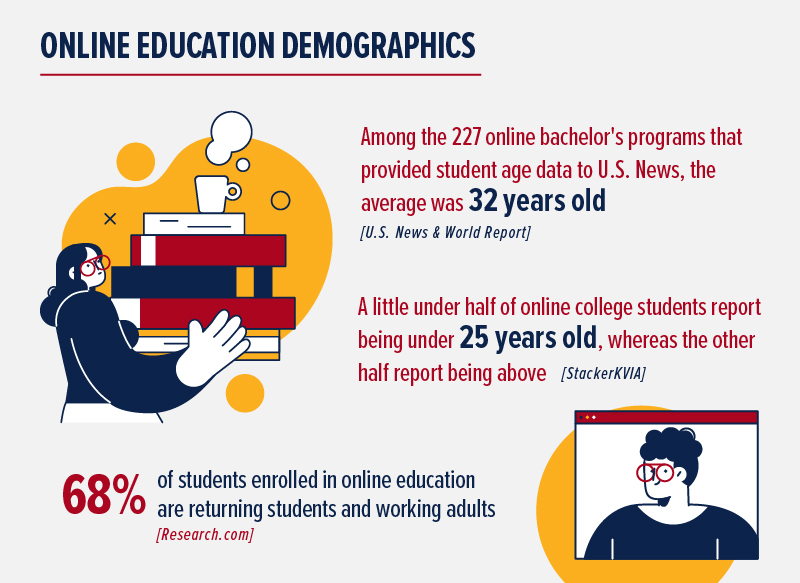
This dominance isn't accidental—it's the result of a dramatic demographic transformation in postsecondary education. Nontraditional student enrollments grew by more than 200% between the 1990s and the 2000s, with this growth correlating directly with advances in online education. Today, adults over the age of 25 represent roughly 40% of all U.S. higher education enrollment, totaling nearly 8 million learners, and their presence is even more pronounced in online formats. There is a positive relationship between schools' percentage of online students and their percentage of adult students, indicating that institutions with robust online offerings naturally attract older, working learners. The numbers tell a compelling story: online education hasn't simply accommodated adult learners—it has been fundamentally shaped by their needs, schedules, and career aspirations, making them the driving force behind the digital transformation of American higher education.
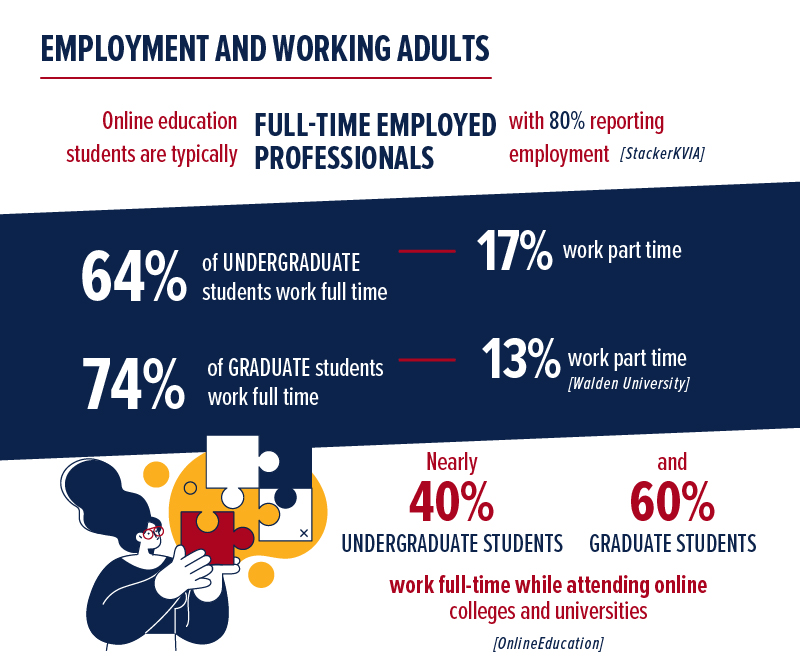
Why Adults Go Back to School
There are several compelling reasons adults choose to return to higher education, each reflecting the unique circumstances and goals that come with life experience and professional maturity. The Milwaukee Independent and Higher Education Today, among others, outline a few of these, including:
- Finish the degree you once set aside: Many adults may have left college due to financial constraints, family responsibilities, or career opportunities that seemed urgent at the time. Years later, they often find themselves at a crossroads where completing their degree becomes both professionally necessary and personally meaningful. Universities like the University of Arizona Global Campus (UAGC) make this transition seamless with programs designed to accommodate students who may have been away from academics for years, offering learning support services and flexible scheduling that wasn't available during their first attempt at higher education.
- Find your way: The path from high school to college isn't always a straight line, and many times students who are on that route are detoured by work or family commitments.
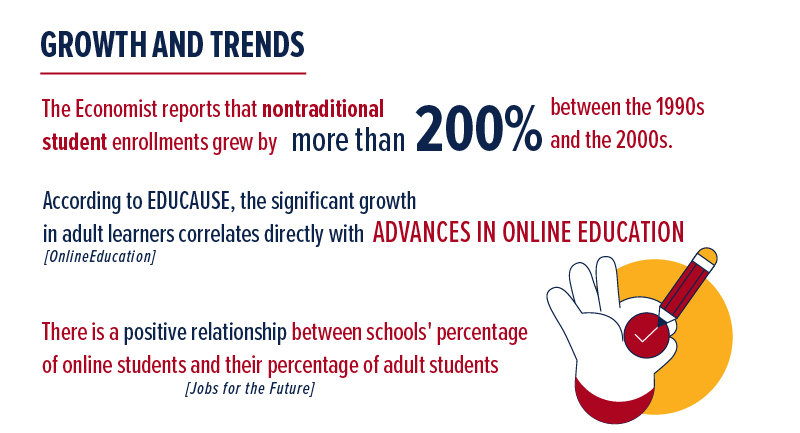
As student Lisa F. put it, "I am going to school to finish what I started. Leaving things undone is the worst kind of regret."
- Learn new skills for a rapidly evolving market: Today's job market evolves at an unprecedented pace, with new technologies and methodologies constantly reshaping entire industries. Adult learners recognize that staying competitive requires continuous skill development, whether that's mastering digital marketing, understanding data analytics, or learning emerging technologies. Online programs allow working professionals to acquire these critical skills without stepping away from their current positions.
As Carol H. explained, school is necessary to keep up with technology or "we will be lost in the shuffle of being uneducated and jobless."
- Stabilize your career: Many adults return to school to solidify their professional standing and create more secure career trajectories. A degree may serve as protection against layoffs, open doors to leadership positions, and provide the credentials needed for long-term career stability. This is particularly important for those in industries undergoing significant changes or consolidation.
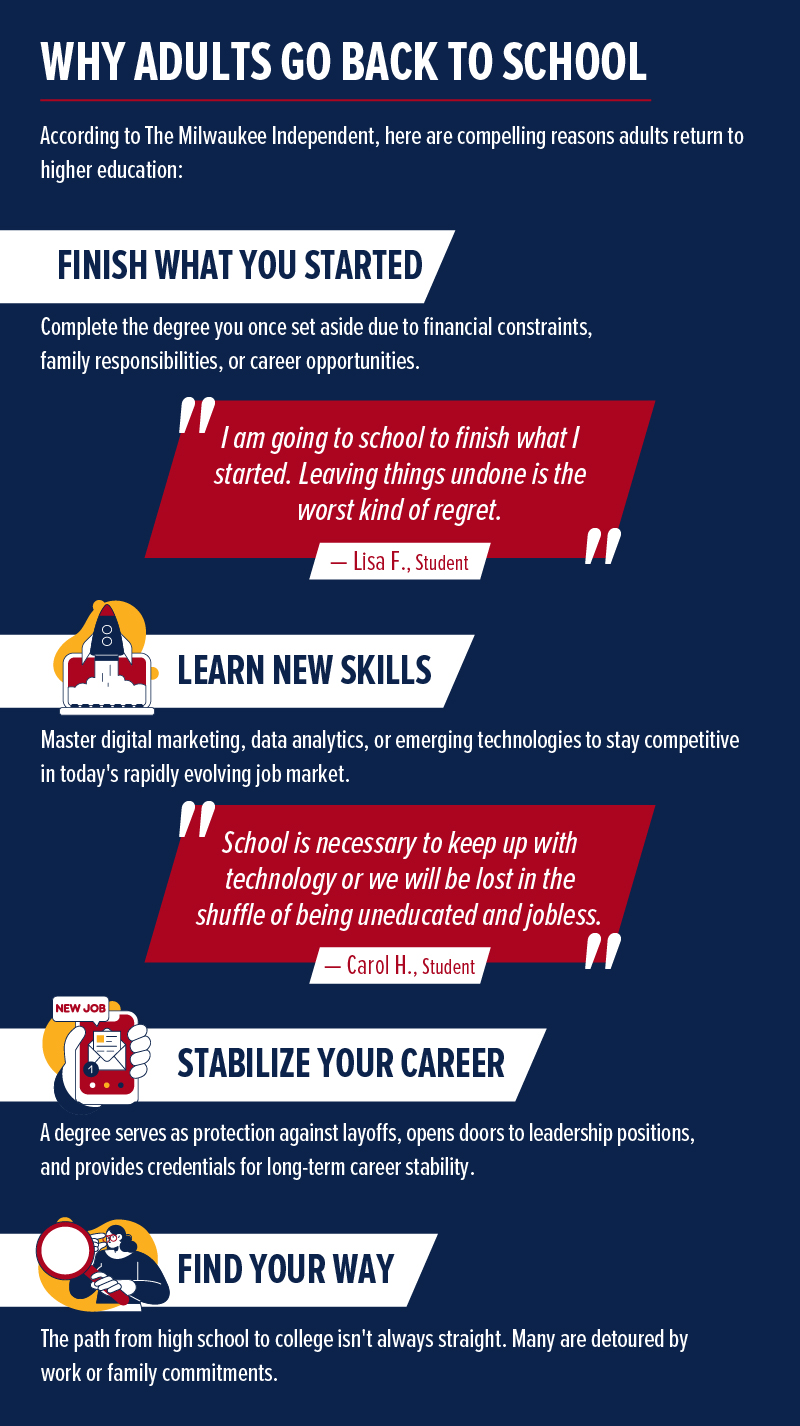
Samantha L. shared, "I am going to school because I am not satisfied with settling for the average—struggle daily and do what is expected — life that I was stuck in for many years."
- Pivot to new industries: Career transitions have become increasingly common as adults discover new passions or seek better work-life balance. Whether moving from corporate environments to health care, transitioning from physical labor to technology roles, or pursuing entrepreneurial ventures, formal education provides the foundation and credibility needed to successfully enter new fields.
- Personal achievement: Many adult learners say school is a gift they want to give themselves, citing the desire to become a better, more educated person as their reason for enrolling in college.
"I think for me it was mostly about challenging myself and just furthering my education," said Tari J. "Sure, it's nice to make more money, but for me it was never about money."
- For your children: If you're weighing the pros and cons of going back to school as an adult, consider the positive impact that earning a college degree can have on your kids. We all want our kids to have a better quality of life than we had growing up, and for many, getting a college degree is the first step toward making that happen. Going back to school can also motivate your children to place value in their education and attend college.
"I need to set an example to my 23-year-old son, so he too can pursue an education," said Narda P. Rogina G. added, "I want to set an example for my 16-year-old son. I hope to inspire him to do great things and do them no matter what obstacles he faces."
- To be first in your family: Being the first in your family to earn a degree means you'll set the standard for future generations, and it doesn't matter what age you finish school.
Christina B., a student who is also a grandmother, said being the first in her family to earn her degree would change her life and theirs as well. "I'm going to school to show my grandson that working hard is worth it," she said.
- To fulfill a promise: Generations of parents who never had access to school have instilled upon their children the importance of going to college and earning a degree.
Student Melissa M. shared her story of a loved one who passed away in hospice, and the promise she made to go to school and work toward improving the conditions for patients and families facing similar struggles. She now wants to become a patient advocate, saying, "I would love to help other families receive better care in the future."
Why Age Is an Advantage for Adult Learners
Adults bring real-world context to their studies, allowing them to immediately connect theoretical concepts to practical applications from their careers. They're more confident in asking questions, participating in discussions, and building stronger relationships with professors and classmates. Plus, adult students often take their education more seriously because they understand the investment they're making, sometimes even having employer support or clearer financial planning. There are many advantages to returning to college for an undergraduate or graduate degree:
Career and Economic Benefits
- Enhanced job market competitiveness: Lifelong learning allows adults to participate in today’s increasingly complex and technologically advanced job market. A PwC survey found “77% of adults would learn new skills now or completely retrain to improve their future employability.” Adults who return to education can better keep pace with technological and industry changes.
- Professional opportunities: Most adult learners return to education specifically to attain better opportunities in the labor market and increase skills, enabling professional growth and career progression. In Education Advisory Board’s most recent survey of adult learners, 41% said they seek further education as a means of career advancement, with higher education offering the opportunity to gain specialized skills, earn industry-recognized certifications, and build a professional network.
- Industry transition support: Formal education provides the foundation needed for career pivots, with many adults seeking to extend education to another field or pursue new professional interests. Economists have been warning that more and more people hoping to switch careers would need to get additional education to go from one workplace to another, with three-quarters of hiring managers saying they're more likely to hire workers over 45 with relevant training or educational credentials than with only work experience.
Personal and Intellectual Development
- Knowledge expansion: Adult education allows for significant expansion of horizons and opens up new possibilities beyond current career limitations. Learning continues throughout life and doesn't stop after initial college completion.
- Personal development goals: Personal development stands as one of the four primary reasons adults pursue further education, alongside career advancement and market competitiveness.
Societal and Economic Impact
- Contribution to knowledge-based economy: Adult education is crucial, making educated adults valuable contributors to national competitiveness.
- Enhanced social mobility: Education creates social opportunities for adult learners and improved social status.
Practical Skills Acquisition
- Relevant skill development: Modern adult education accommodates working professionals through part-time programs and flexible scheduling, making skill acquisition practically achievable with immediately applicable skills. Adults are often interested in learning subjects that have immediate relevance to their work or personal lives, with instruction designed to address real-world problems and applicable to their daily lives, as adults are problem-centered rather than content-oriented, Oppida finds.
- Flexible learning options: Adults can study around their job and family commitments, and some employers will even help pay for it.
Your life experience is extremely valuable, giving you an advantage over younger students who move directly from high school to college. You have a wealth of practical and applied knowledge that you can share and contribute to your fellow classmates. Rather than seeing age as a barrier, adults should recognize that their life experience, motivation, and practical skills make them ideal candidates for academic success. This research validates that adult education is not just personally fulfilling — it has the potential to be economically strategic for individuals, employers, and society as a whole.
Steps to Going Back to School After 30 or 40
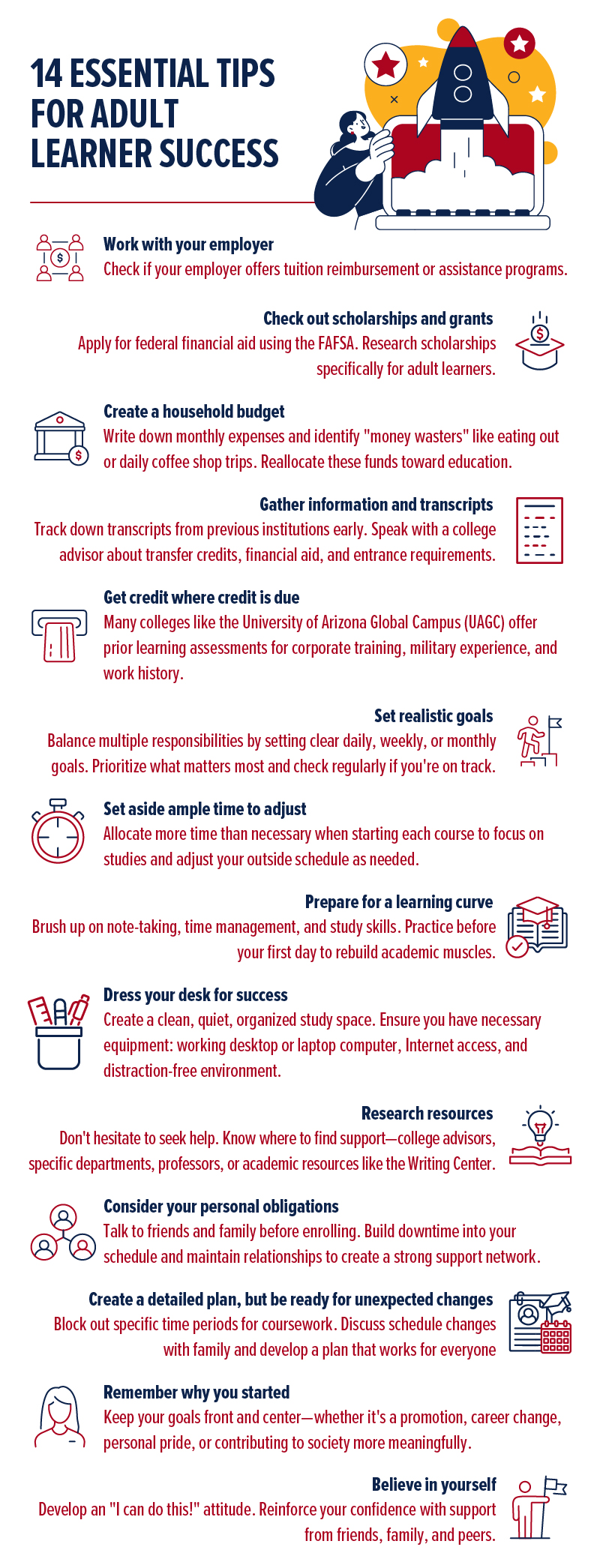
Going back to school as a working adult can be very exciting yet overwhelming at the same time, especially for students who dropped out in the past before completing a degree. Taking the leap to continue your education brings on a lot of new challenges. However, if you're prepared, you can easily overcome these obstacles and successfully transition into life as a college student.
Here are the major decisions and steps you need to make when heading back to college:
- Decide which degree to pursue
Older students often come with more professional experience, even if they have less formal training. Whether you want a new degree to help you in your current career or to change career paths completely, it's important to know what kind of degree and degree focus will help you achieve your specific goals. Do your research about each degree program that interests you so you can be sure that the one you choose will contribute to the future you want for yourself and your family. Online colleges, like UAGC, offer many of the same degrees as traditional schools, but without the hassle of traveling to campus. Each 5- or 6-week course is taken one at a time, helping to ensure you have the time and energy to balance your busy life alongside your studies. - Choose between an online or traditional program
The type of school and program you choose to attend can make a significant impact on your relationships, employment, and educational responsibilities. Many older students are turning to online colleges and universities because they offer more flexible schedules to accommodate full-time employment, plus digital courses and materials that support remote attendance. The ability to attend classes when, how, and where it fits your schedule has been a paradigm-shifting innovation in higher education. For midlifers with jobs, kids, or other obligations, it can even be the difference between being able to go back to school or not. While many adult learners admitted they felt "too old" to return to school at first, their attitude quickly changed when they realized how much an education meant to their lives. "I have a friend say, 'you're not too old to start on your degree,'" said Knox D. "So, here I am today earning my BA in Early Childhood Education." Busy working adults know there are only 24 hours in a day, which is why the convenience of online education is one of the main draws. Students can study from anywhere with Internet access — that means you might submit an assignment before you start your workday, study at home after your kid's soccer game, or collaborate with classmates located across the country while you sign onto your computer at the local coffee shop. - Assess your finances
College is an investment in your future, but to see any return on that investment, you'll need to contribute. Beyond tuition, figure out how books and other academic costs might impact your household budget. Investigate financial resources, and make a financial plan that incorporates your school expenses. Though some working adults pay for college strictly from earnings, some may qualify for loans, grants, and even scholarships. Adults can also take advantage of 529 college-savings plans for themselves. The process to find out if you are eligible to receive funding begins with completing the Free Application for Federal Student Aid (FAFSA). Good colleges will have financial services advisors to help you track this and other paperwork. Research grants and scholarships ahead of time to ensure you meet their submission deadlines. As you begin to structure your financial options, it's important also to create a household budget to help reallocate your expenses to include your college tuition. Start by writing down your monthly expenses and see if you can find any "money wasters." For example, eating out at restaurants, buying new stereo equipment, or even your daily trip to the coffee shop could all be considered money wasters. Try cutting back on things that you don't truly need and save that money for your education. - Gather information and transcripts
Before you start a new endeavor, it's important to gather as much information as possible. Before you start your first day of class, you'll want to make sure that you're setting yourself up for success. If you've gone to college before, you want to make sure those classes count. Unfortunately, this process isn't always smooth. Students have to be proactive in tracking down transcripts. Starting early and leaving time for complications is better than panicking if things bog down unexpectedly. Additionally, speaking with a college advisor is one of the easiest and quickest ways to gather information before heading back to school. Advisors are prepared to assist you with questions pertaining to financial aid, transfer credits, high school and college transcripts, life experience credits, military benefits, entrance requirements, classroom experience, and they can also walk you through the application process once you've decided to make the leap. - Get credit where credit is due
These days, some colleges offer prior learning assessments that give credit for corporate training or seminars. Even if you weren't in school, you developed real-world skills. Your life experience — whether in the military, in the workforce, or in the home — is extremely valuable. With UAGC, you may also have your work and military experience evaluated for college credit. When you translate your training and work history into transfer credits, you shorten the time it takes to graduate and save on tuition. At UAGC, we will work with you to review your previously earned credit to determine what may apply to your chosen degree. - Set realistic goals
You'll be juggling multiple responsibilities while you're in school. It's crucial that your goals are both realistic and responsible so that you can earn your degree without burning out in other areas of your life. Be clear on the changes and sacrifices you're willing to make and the non-negotiables that need to remain a priority. Set daily, weekly, or monthly goals for your biggest priorities, including school, and check them regularly to see if you're on track. One of the most important ways for adult learners to create a schedule is to stay realistic. Setting aside half an hour to study might not be enough. On the other hand, not giving your family enough time can also impact your life. The point is to prioritize what you need to do each week. - Set aside ample time to adjust
It may take time to get used to studying and absorbing new material in college. When you start each new course, allocate more time than you think is necessary to focus on your studies so you'll have time to adjust your schedule outside of school as needed. If you make time for school from the outset, you'll be less likely to drop the ball in other areas when things start to ramp up. - Prepare for a learning curve
Many adults have gone years without studying, which means skills such as note-taking could be rusty, and it has probably been a while since you've opened a textbook or written a research paper. It's important to brush up on your student skills before returning to school. Time management, study sessions, assignment deadlines, and classroom etiquette are all things that you'll be faced with when you return to school. Do your best to prepare for these situations and maybe even practice a few before your first day in the classroom. - Dress your desk for success
Make sure you have the equipment you need. It's possible, particularly with the University of Arizona Global Campus mobile app, to keep your online classes and materials right at your fingertips. It's imperative that you create a clean, quiet, and organized space where you can be free from major distractions. Your study space could be a room in your house, a corner in the library, or a peaceful setting outdoors. Wherever you decide to study, be sure it's in a place where you can dedicate your attention to your coursework. This designation can potentially increase your success with future assignments. - Research resources
Don't be afraid to seek assistance if you ever find yourself confused. Returning to college can present new and foreign experiences. It's totally normal to not understand things completely the first time you experience them. But you shouldn't feel apprehensive about reaching out whenever you need help. Be aware of your resources when you return to college. Once you know where to find help, you'll be more inclined to use that support system. This support may come in the form of a college advisor, a specific department, or a professor within the classroom. Academic resources like the Writing Center can help you overcome writing challenges. It's there whenever you need it, whether you're making sure you cite your sources correctly or want to brush up on basic skills. - Consider your personal obligations
Consider the ways your choice to return to school may impact your relationships. Many online college students work full-time so they can balance work, family, and school. For family members who've dedicated their lives to raising and caring for others, they may find it hard to take time for themselves to finish their homework. Talk to your friends and family before enrolling and tell them why education is so important to you. Don't forget to build downtime into your schedule for friends and family, whether it's making sure you never miss your kid's Little League game or joining co-workers for happy hour once a week. While attending school, you may also establish new relationships. If you're a working adult, you will find yourself among true peers in both classwork and lifestyle. Reach out to classmates you meet through discussion groups and Facebook pages. They're invaluable for support as well as for help with questions. When you maintain healthy relationships throughout your transition to college, you create a strong support network that will empower you. - Create a detailed plan, but be ready for unexpected changes
Time management will play a big role in your success as a college student, especially if you're returning after a long break. One way to make the transition back into the classroom easier is to create a schedule. Take a look at your calendar and block out specific time periods to dedicate toward your coursework. It's also a good idea to let your family know that your schedule will be changing. Discuss how this change will affect everyone else and try to develop a schedule that fits best with the entire family. Once everyone is on the same page, sticking to your new schedule will be much easier. - Remember why you started
Always keep in mind the reason you went back to school in the first place—whether it's the chance to earn a promotion, make a career change, gain a sense of personal pride and accomplishment, achieve personal growth and job satisfaction, or contribute to society in a more meaningful way. Putting your goals first can keep you motivated and help you focus on what matters most when the work really piles on. - Believe in yourself
Going back to college can be overwhelming—to say the least. That's why the most important step you can take before returning to school is to develop and learn to maintain an "I can do this!" attitude. Reinforce your confidence with support from friends, family, and peers, and you'll be well on your way to earning your degree and reaching your dreams of higher education.
Real Stories from Adult Learners
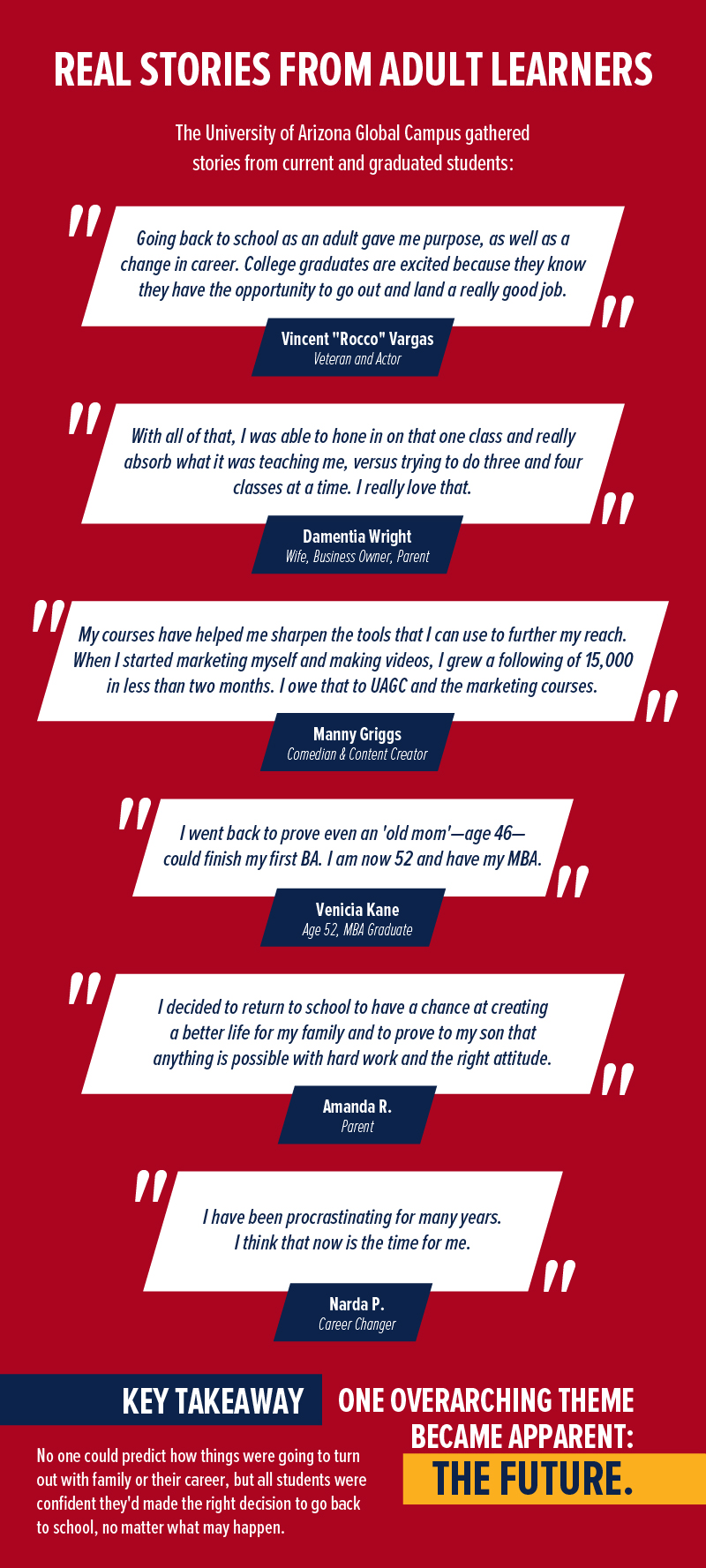
UAGC has interviewed current students and graduates, asking them to explain their reasons for going back to school. After listening to countless stories, familiar trends began to appear, and the reasons became as diverse as the UAGC student body.
For veteran Vincent "Rocco" Vargas, going back to school as an adult gave him purpose, as well as a change in career.
"College graduates are excited because they know they have the opportunity to go out and land a really good job," he explains.
Similarly, Damentia Wright relates to returning to school as a full-time working adult. She explains: "I'm a wife, I'm a business owner, I'm a parent. With all of that, I was able to hone in on that one class and really absorb what it was teaching me, versus trying to do three and four classes at a time and trying to pack all that in. I really love that."
For Manny Griggs, comedian and content creator, a college degree was his ticket to success in his chosen field.
"My courses have helped me sharpen the tools that I can use to further my reach. When I started marketing myself and making videos, I grew a following of 15,000 in less than two months. I owe that to UAGC and the marketing courses."
Venicia Kane proved that age is just a number: "I went back to prove even 'old mom'—age 46—could finish my first BA. I am now 52 and have my MBA."
Amanda R. wrote, "I decided to return to school to have a chance at creating a better life for my family and to prove to my son that anything is possible with hard work and the right attitude."
Narda P. shared, "I have been procrastinating for many years. I think that now is the time for me."
While many of the students gave similar reasons for returning to school, one overarching theme became apparent in the responses: the future. No one could predict how things were going to turn out with family or their career, but all of the students were confident they'd made the right decision to go back to school, no matter what may happen.
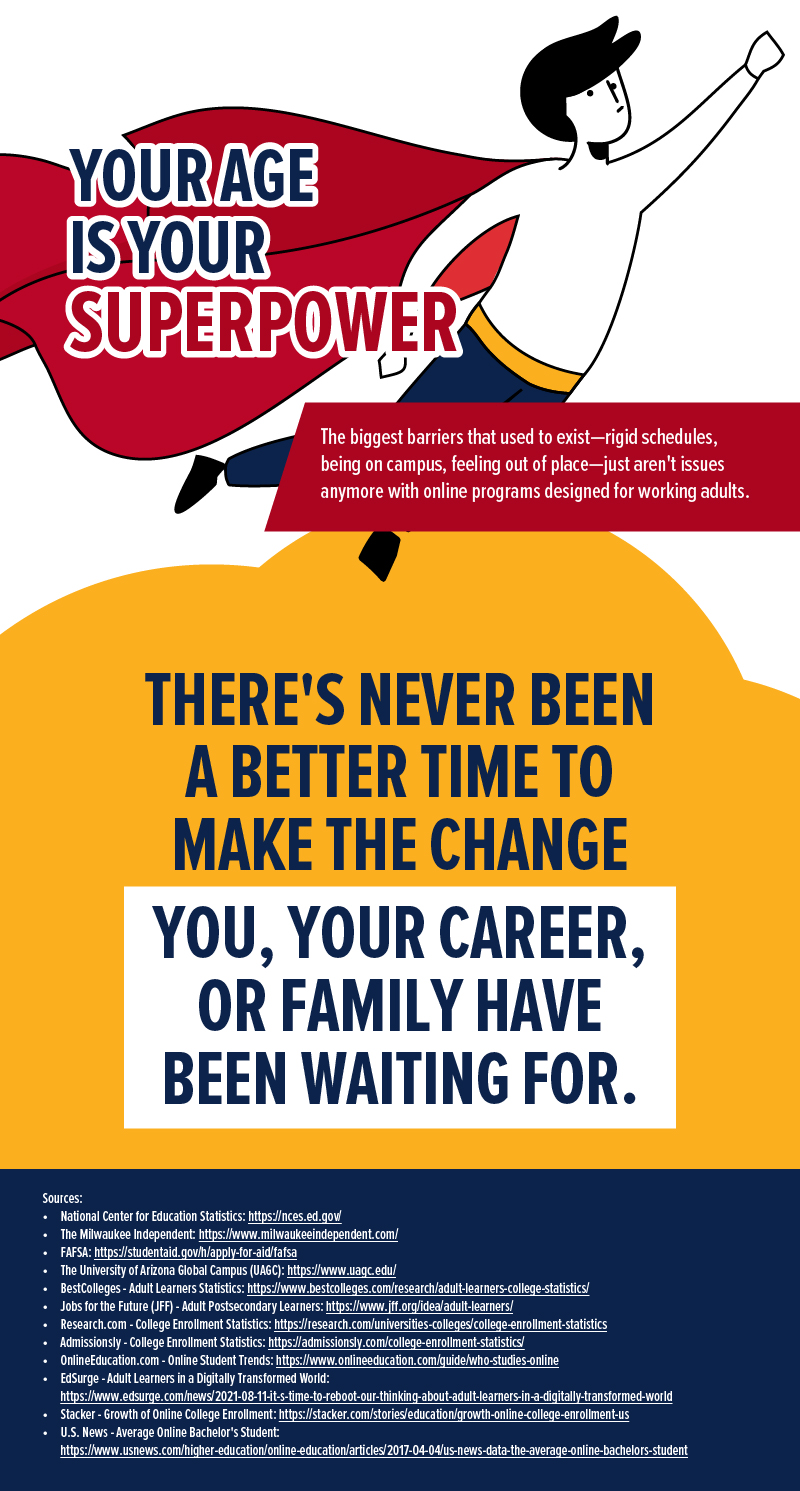
Conclusion: Your Age Is Your Superpower
Going back to school as an adult is achievable thanks to both how much education has changed, and by adults' changing motivations for education. The biggest barriers that used to exist—rigid schedules, being on campus, feeling out of place as an adult learner—just aren't issues anymore with online programs designed specifically for working adults.
With motivation — and career benefits — on your side, now is a great time to go back to school for your undergraduate or graduate degree. If you've been thinking about it, there's never been a better time to make the change you, your career, or family have been waiting for.
Preparing for going back to college after 30 or 40 is just the beginning of a beneficial journey. If you hold steady to the reasons why you wanted to go back in the first place, prove your perseverance, and put in the hard work, then you'll be well on your way to earning that life-changing degree.

